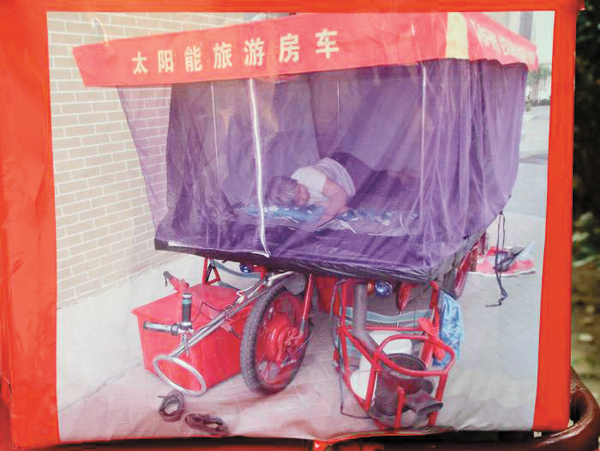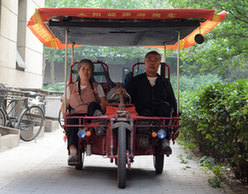Circling the globe on 3 wheels
 |
|
Katherine Ileana Rodriguez / For China Daily |
"She always said she wanted to go to West Lake in Hangzhou some day. I felt I owed her a lot and promised to travel around the country with her after retirement," says Li, who declined several job offers after retirement in 1997, and instead studied how to assemble a vehicle.
"We can't afford to travel on planes or trains, therefore I decided to make a tricycle," Li says.
He produced his first man-powered tricycle in 1999, but it was not until he finished his fourth-generation vehicle, in 2004, that they were ready to realize their dream of touring the country, including all the provincial capitals, the four biggest deserts and 15 mountains higher than 4,000 meters.
To save money they slept in the vehicle overnight and carried cooking tools such as a stove and even simple ingredients so they could prepare their own food.
"We hadn't thought of traveling around the world until we met a lot of foreign cyclists in Tibet," Li says.
 |
| Retired couple embarks on worldwide tour |
"They communicated with us in bilingual notes on a notebook, and showed us their routes on a map, which inspired us to use the same method to tour the world."
After returning from his national tour in 2006, Li was named as a torchbearer for the 2008 Beijing Olympics and started to plan his next trip.
The couple upgraded their man-powered tricycle into a fifth-generation solar-powered vehicle, and set out on their world tour in 2011.
However, after visiting six countries in Southeast Asia, the couple was unable to enter Myanmar through Thailand due to visa problems, and the vehicle broke down.
Though they failed to complete the journey, it gave them valuable experience and confidence that they could tour the world.
To introduce themselves to locals, they wrote on a piece of paper: "We are a retired couple from China. Our dream is to visit 100 countries with our self-made solar vehicle. We want to stay here for a night, please nod for agreement and shake your head if it is inconvenient."
"Everyone nodded, some even asked if we would like a shower, or wanted to charge our vehicle, or treated us to dinner in their own home," Li says.
Learning from failure, Li changed the 80 kg solar panel to a lighter but more effective version, worked on the electric circuits, and prepared three electric motors to take with them.
"The six-country trip made us more determined to travel to 100 countries. We must realize our dream this time," say the couple, who have decided to sell their apartment in Shenyang if they cannot pay the travel costs.
They also did a notarization at Shenyang Medical College to donate their bodies and organs to a local medical organization if they meet any misfortunes on the road.
Despite the dangers, their son is supportive of their venture.
"We got the idea and started to draw up plans when our son was a teenager, he knows it is our dream and therefore has always supported us," Zhao says. "People live different lives, some like to play cards at home, but we like to enjoy ourselves in nature.
"It was hard at the start, but we made the first step and now we will never stop," she says.
They also expect their story will encourage more elderly people to go outdoors, enjoy the beauty of nature and live healthy lives.
"Stop playing mahjong at home, go out to open your eyes and hearts by traveling. Happy minds mean healthy bodies, and (traveling) also leaves you with precious memories."














